Shatterzone by FourmyleCircus
Introduction
Original SA postAccidentalHipster posted:
If you mean Dan Brereton, he's the guy who drew my avatar, the Spider. He also did the Nocturnals series which I love to pieces. ShatterZone sounds awesome though.
Oh dear lord, it took me two days and several re-readings for me to realize you meant that you, the fan of Dan, wanted me to read it. And not that you wanted me to read it because you were a fan of him. I'm going to blame this on my bleaching my hair for Halloween. That said, I had no idea that that was supposed to be The Spider in your Av. Actually a fan, but I'm more used to him looking like this:
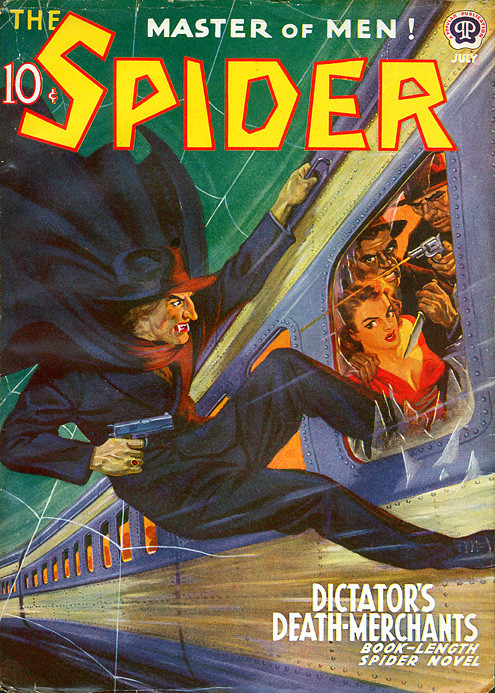
And sorry for the blank stare on the name. I know I'd get the same treatment from most people if I mentioned Warren Murphy or Lester Dent. Just... yeah. I've apparently only seen one of his works in my life, aside from your Av, and that was the cover of Hellbilly Deluxe.
I didn't want to come back without content.

Shatterzone is an odd duck. Originally produced by West End Games back in '93, it was sort of a dumping ground for all the ideas that were Veto'd by the boys at Lucas Arts in regards to things to add to the Star Wars system. Theoretically, it was supposed to be a new world for Torg, too, but it ended up being it's own thing. Some of you might have gotten the wrong idea when I called it a focused version of Masterbook. It might be more accurate to call Masterbook a generalized version of it and TORG. As you can see from the above link, you can get it, and many fine related products from Precis Intermedia Games.
A little more background on the name itself. Shatterzone comes from a 18th century geological term referring to a network of fissured rock forming veins of mineral deposits. After World War 2, it gained it's own socio-political meaning. A Shatter Zone is a borderland, where the traditional ideas of Government and Economy are broken and people are filling in the cracks in a personal way. Shatter Zones are places of isolation and resistance, where people solve their own problems. Places where refugees and rebels congregate, where war is just outside, but here, for now, you're safe. Where no one trusts the government, nor finds they need one.
This is a good peek into what the book promises. Does it deliver it? Well, that's in the Universe Book.
I'm going to be using the Reprint version, as that's what I have. All three books, The Rule Book the Player's Guide, and The Universe Guide, in one PDF. I'm going to start with the Player's Guide for the sake of those following alone at home. The Rule Book is first in the PDF, but it's probably best to ease you into this gently...
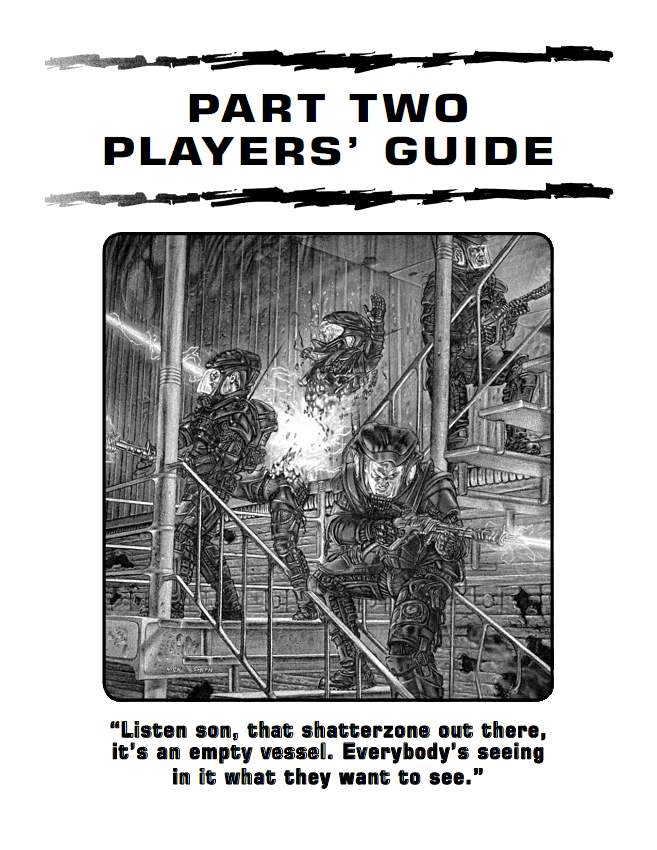
Ah, who am I kidding, The Player's Guide has the most interesting and infuriating bits, and it really doesn't matter which direction you come at this from. I mean, you open up the players guide, and first page of actual content, you see this.
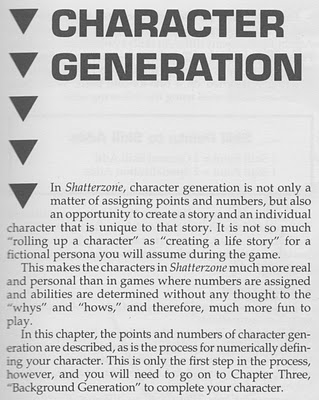
It's 1993.
Once again, I'm kidding. The next thing it talks about are the "Character Profiles". " Character profiles is the term we use to describe the written and calculated information about a character created using the Shatterzone character generation system. There are two type of Character Profiles: those we make for use in the game, and those you construct for use in the game."
They've put in sixteen completed, ready-to-run Profiles. They're a "smattering of different type of fictional characters you might want to play in the Shatterzone game universe". That's right, you've got sixteen pregens. And you're encouraged to photocopy them off and just toss names on them. This should be no surprise for the people who played D6 Star Wars. If you want to change the gender of the character, invest in white out because they've got character portraits. The first half of character Generation is about how to use and read the pregen characters. So, have a pregen.
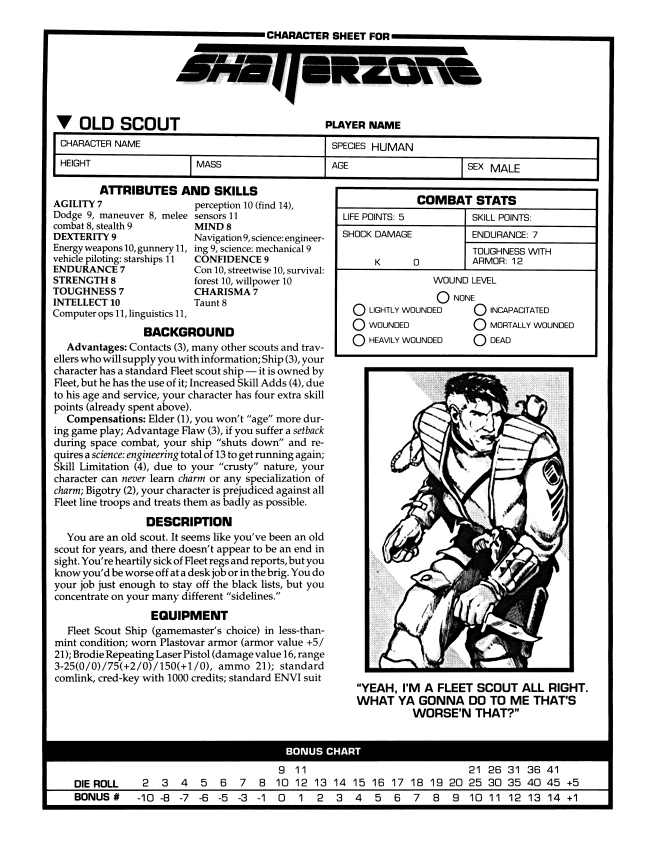
I don't want to harsh on this game for this, actually. I mean, other games have rocked it. It was Okay in Shadowrun, and certain versions of Talislanta . Hell one edition of Talislanta didn't really have any other character generation system.
Step One, Choose your profile. The sixteen in the book are Old Scout(above), Corp Marine, Kestarian Temptress(Four Armed Blue Skinned Alien Babes), Megacorp Freelancer, Hard Warrior(Mutant with natural armor), Glahnite Trader, Vizzben Con Artist, Cyberchopper(Cyborg Criminal), Bolter Refugee(Ratman who can't speak English), Shatrat Blacklunger(Mutant Space Scavenger that speaks in Thieve's Cant), Alien Adventurer(Lizardman that regenerates), Hot Shot Pilot, Man from Intel(Spy), Mercenary Veteran, Streetrunner(Skill monkey that NPCs will hate. So... Bard), and Student Ganger(Martial Artist with no social graces).
Step two, fill in your name, character name and so on. The sex and species, are of course, set by default, so you'll have to white out some stuff if you want to play a female scout or a male Merc. But age, weight, and height are yours to mess with. They they recommend certain combinations, like you're not going to find very man fat fast people. Or short strong people. Oh, the freedom! The story! Step three, gaze over the Attributes and skills without really understanding anything as they'll cover it later.
They do go into a little detail on it. The way things are set up on these sheets is that You've got the Ability, then the Skill(With and focus it might have), and then a specialization. They'll cover all this stuff in the next chapter. Points in skills are called Adds, because the skill just adds onto the attribute. If you want to tinker with the skills... Tough. The book recommends the GM make you just make one from scratch. It gives some basic information on how to do it though, by telling you that each profile is built on 65 attribute points and twenty skill points. Attributes are assigned on a one to one basis, except for toughness which is derived stat following this formula ((Endurance*2)+Strength)/3. Because, hey, it's 93. Skill points turn into Skill Adds at a one to one for general skills and one point will get you two points in specializations.
Step four is to look at the Backgrounds list. Backgrounds are split up into advantages and compensations. Or Disadvantages, if you're used to any other system out there. Different backgrounds cost different amounts, and give different effects. You know how this works. Compensations are complications that make up for or explain the above. These will be explained in chapter three, Background generation. And no, it's not something fun like a Life Path system like Star Trek, Cyberpunk 2020, or Traveler. It's just "numbers on a sheet". If you want to tamper with the background stuff of a character, don't. Just make a new one. That's their advice.
Step Five is the Description. The Basic Description isn't the physical description, that's what the Illustration box is for. It's more of a summary of your characters history and general attitude on life. Yep. Play your character the way the piece of paper tells you. Take a good wiff of freedom boy! You won't smell anything like this in yer Dungeons and Dragons. The Quote is simply something that the character would say.
Equipment is pretty much whatever things they've got laying around, excluding " really mundane items like clothing". You're also assumed to have a hundred credits in pocket change at the very least, though most characters will have more. If you want to know what any of this does, you'll have to check chapter eight of the Universe Guide.
Step five is glancing at the Combat box with an uncomprehending eye because they don't tell you exactly how you take damage, just that you're supposed to circle wound levels when you take them, and that they'll explain Life Points(which start at 5) in chapter five, and Skill points(Which start at zero) in chapter two. And with that that, you're done! Just go play. They'll wait. What, how the dice work? You don't need to know that. Just play.
I'm going to break sequence a bit and actually explain some stuff quick. Life points are kinda like Fate Points and the like. Life points You spend them for various effects, including preventing your character from dying, and also rerolls. That bar on the bottom of the character sheet is the bonus chart. The way things work is you roll 2d10, and then check the chart. This tells you what you can add/subtract to/from your skill. As you can see, the most common rolls get you jack, so you're going to be going off your skill most of the time. A lot like FATE. Unlike FATE, tens explode. And there are all sorts of things, including spending a Life Point to roll again and add your new total to the old one.
Confused? Good. They don't explain any of this stuff for four more chapters.
Let's go to making your own character. Step one: Copy a blank character sheet. Step two... Create a character concept. "Every character in Shatterzone should be summarized by a central concept." In other words, come up with and play a stereotype in a fictional world you barely know. Hey, maybe I am reviewing a John Wick game! You want to be pretty general here, because you may play this same character half a dozen times in different ways. There's a helpful little example sidebar here... showing what sort of twisted thought process they've got going on, and giving you a peak at the setting.
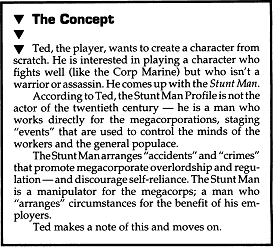
So, this is where I'm going to break. Who wants to help me, knowing as much about the setting as your average player who hasn't been handed the Universe Book, come up with a concept for this? Over the next few chapters, I'll make whatever abomination I'm given and try to fit it in. And before you say this seems strange, everyone I know would say "If you're using pregens, what's the point?" If I don't get anything, I'm going to write up my Mass Effect character because... well... The actual setting makes me thing of a fucked up Mass Effect AU. Humans will be easiest, as they're going to be the most common, but Aliens can be weirder because you can literally take "They're an alien!" as a flaw.
Character Generation
Original SA post
This is neither here nor there, but a couple of the people I know who know John Wick tend to talk of him as two different people. There's John, who is their friend and a game designer, and The Wick, the biggest cheating bastard they've ever had the misfortune of running into. And when he runs games, he'll spend months as John, being perfectly normal, and then some nights he's just holding himself different and they know tonight is going to be hell because it's not John running. It's The Wick. Some of them refuse to play when he's The Wick, but The Wick doesn't seem to care, even if he calls the next day to apologize.

Traveller posted:
I want you to make Space Mary Poppins, which is most certainly an appropriate concept for this game I know nothing about.
Without Further Ado, I give you the concept you requested... The Nanny .
The Nanny exists outside the system, working to preserve order by any means necessary. Not Social Order, as others may do, but house hold harmony. If you can find her, if you can afford her, she can turn the worst problem child into an angel(rarely literally, but it's been known to happen). One part event planner, one part psychologist, one part spy; The Nanny is a miracle worker par excellence. No one knows more about children, or what secrets they hold.
Of course, it is not all sunshine and rainbows. Rumors have it that her charges become agents in their own right, shaping those around them to fit Her will. Beware. Beware the Nanny, for she knows more about you than you ever will.
AccidentalHipster posted:
Don't sweat it man, I'm used to being a total hipster. As for character, I vote for Joseph Joestar, kung fu monster hunter and lighthearted trickster with the psychic ability to predict his opponent's one-liners because I wanna know how psychic powers work and we need something to balance out Dio and the other Jojos that fought him aren't as funny.
The next thing you're going to say is, "You really like Jojo, don't you?"
Anyway, Young Joseph is... The Psi-Rat
Growing up without parents is never easy, but it's worse still when you're a second generation Psionic. If they know, no one trusts you; if they don't you have to be careful not to let the cat out of the bag. You grew up hard, on the streets and in labs. Your rich "uncle" was little more than a researcher trying to find out more about you, to use you as a weapon. Your 'kindly teacher' is prepping you to use as a war machine against Xenos unseen by the rest of the galaxy. The only person you can depend on is yourself. The only weapons you need are your fists and your mind.
And the occasional bottle of Neo Coke Classic.
Now that the concepts are out of the way, it's time to start working on step three, Attributes and Skill points. This isn't, as you might expect, allocating the skill points, that's step four. No, this is determining how many you get. There are two ways of doing this, and I've got two characters. The first is to just take the 65 Attribute Points and Twenty Skill points that all the Pregens are based on. Sounds good for The Nanny. The other is... Random roll! Looks like I'm not the only liar here. Remember?

This looks like both assigning numbers without why or how, and rolling up a character. But hey. Let's go to the chart.
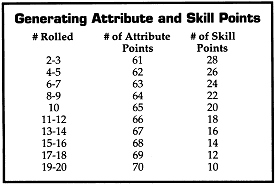
Roll 2d10, sum the result, and check the chart. A one and a three gets me 62 attribute points and twenty six skill points for the Psi-Rat. Which is nice, because he'll need them.
The eight attributes in Shatter zone are Agility, Dexterity, Endurance, Strength, Intellect, Mind, Confidence, and Charisma. Agility is your gross motor control, while dexterity is your fine. Endurance is how well you can take hardship, and strength is a measure of how physically powerful you are. Intelect is how inventive and flexible your mind is, while Mind is how much you've learned. Confidence is how self-assured you are and how well you can project that, while Charisma is how charming and Witty you are, with maybe a little bit of beauty thrown in.
Attributes can't be below five or above thirteen at character creation, at least, not this stage. Background generation can change that somewhat.
Now that we know how many points we have and what they do, it's time to move on to actually assigning Abbility points in step three. They'd like to remind you, once again, that it'd be so much easier if you just used the pre-generated characters. Let's start with the Nanny.
The Nanny is more of the party face, and certainly not a front line fighter. She's got 65 points to spend. Now, you have to understand that the player hand book says nothing about what is an average difficulty or anything like that, so if you couldn't pry the
Futzing around, and jumping ahead to see what each attribute actually covers, and each skill does, I decided on this spread for The Nanny.
Agility 8
Dexterity 6
Endurance 7
Strength 6
Intellect 12
Mind 12
Confidence 8
Charisma 8
Everything will be explained when I get to skills.
For The Psi Rat, his 62 attribute points are split up as so:
Agility 9
Dexterity 5
Endurance 6
Strength 8
Intellect 11
Mind 10
Confidence 6
Charisma 6
If they seem a bit low, that's okay, he's a Young Prodigy. And by that I mean I'll be abusing the specialization and skill rules.
And remember "You will want to assign your attribute points so that they will affect your Skill Values in a positive way (unless you are creating a really interesting character)." It tells you to go check the Master Skill List on page 14. So... Here you go.
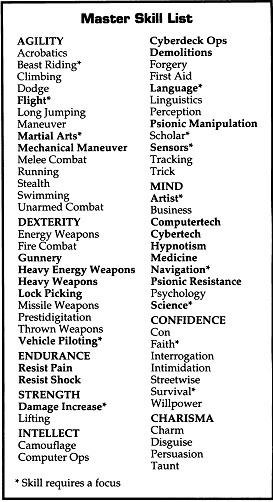
Step Five, Buying Skill Adds.
Long story short, there are General Skills and Specializations. When rolling for a relevant skill, you add your Skill to your Stat, and then you add the Bonus to that total to get your roll. Not that this is ever explained in the Player's Guide.
At character creation, buying Adds is a linear thing. One skill point gets you one Skill add. In play, it... varies. And I'll get to that next time I post. What you need to know now is that the Bold Skills require training, and are thus more expensive, and the normal ones don't require normal training and are thus cheaper. But at character creation everything costs the same.
So, here are the skills I chose for the above. I'll give consolidated sheets when I get through everything.
The Nanny
Agility:
Stealth 2
Dexterity
Endurance:
Resist Pain 2
Strength:
Lifting 2
Intellect:
Perception 2
Scholar: Teacher 4
Mind:
Artist: Song and Dance 2
Hypnosis 3
Psychology 3
The Psi-Rat
Agility:
Dodge 2
Martial Arts: Tai Chi 4(Chosen because I can BS most GMs into letting me get a +2 on psionic attack rolls)
Endurance:
Resist Shock 4
Intellect:
Psionic Manipulation 3(Psi-Strike 4, Influence 2)
Trick 4
Mind
Psionic Resistance 6
Next time, we cover what these skills actually do and background stuff. Psionics will have to wait.
Attributes & Skills
Original SA postPlague of Hats posted:
Hey so I made a site to put F&F reviews on both in case of thread archiving, to make them a bit easier to read (site formatting aside) and to allow them to be read despite the paywall. It is currently sparse, but I can copy-paste with the best of them. I am interested in getting permission from reviewers, though I can also abandon all my heroic work in the face of stern disapproval. Suggestions and pointers on how to make things look better or more readable are also a plus.
MadScientistWorking posted:
This kind of predates Fatal and Friends as a lot of talk about John Wick being a horrible person used to occur back in grognards.txt. Its kind of hilarious too because apparently the discussion that happened in that thread apparently involved stuff in Play Dirty. And man if he is like anything like how he presents himself in Play Dirty a huge manchild is the only thing you can get out of that.
EDIT:
And you're right too a lot of his ideas aren't bad but you have to strip the smug assholish nature from them before you can even begin to use them.
Part of me wants to argue about the whole Play Dirty thing because once I choked my way through, and I took it with the salt due a guy who was making his fortune on being an asshole, I actually thought some of it was pretty good. But yeah, you need to take away the Jefferson Carter bullshit to have even the smallest chance of it being... Readable? Reasonable? I mean, knowing that they signed on knowing he was going to pull this shit makes me dislike him less. But...
Traveller posted:
I dig you idea for The Nanny! Training minispies all over the cosmos.
Thanks Traveller, I really didn't have to do much with Mary Poppins, after all, she did teach the kids psychology tricks in order to make the whole house better. Though it hurt to give her Scholar: Teacher for reasons that are about to become clear.
AccidentalHipster posted:
Joseph really is the best Jojo. And I'm surprised that this character concept worked out so well! If it's not too much of a spoiler, can The Psi-Rat actually do Joseph's "The next thing you're going to say is" trick and if so, how?
Actually, he can do it two ways. The first is that skill Trick, which lets you briefly wrong foot someone by misdirection, bluster, deception, what have you. As someone who does the "Your Next Line Is" thing to people in real life... no, you don't need to be precognitive. You just need to have an idea of the sorts of things they say and be able to talk really fast.
Something I enjoy doing to my SO, actually. My record is not only predicting that first sentence, but speaking in exact unison with them for nearly a full minute as they tried desperately to find something to trip me up. I left it at four rather than making it, say, Trick 2 (Bluster 4) or (Bluster 2 Misdirection 2) simply because of how often he switches between that and doing stuff like unraveling his clothes to make a ripple net.

Alright, as trying to follow the actual structure of the book is becoming too much of a pain(as the first chapter is pretty much just See Page XX), I'm going to go through the chapters and pop back to One whenever it actually has something useful to say. I really don't want to have to do this, but it forced my hand. And I suppose it's my one complaint about the Reprint PDF I'm using(aside from the simple fact that it's ever so slightly rotated)... it doesn't have PDF links. It's got bookmarks though, so that's good.
So, Attributes And Skills. You already know a lot of this being long time gamers, but Attributes are Raw Ability, where as Skill Adds are knowledge and expertise. If you want to dodge something, it's Agility, unless you have Dodge, in which case it's Agility plus Dodge.
Now, there are Four types of Skill Adds(which will never stop sounding clumsy to me, even in Masterbook). Trained, Untrained, and Macro skills, as well as Specializations. Untrained skills are skills you can use untrained, and, in play, only cost one Skill Point per level. Which is to say that if The Nanny wanted to boost her Stealth from Two to Three, it would cost her Three points. With Trained Skills, it costs Ten Skill points to bring it up to level One... unless you can find a Teacher, in which case it costs five. From there on, it costs double the Skill Rank you're going for, so to raise it from One to Two, it costs four... Unless you can find a teacher, in which case the cost is the same as for Untrained skills.
So, For The Psi-Rat to raise his Psionic Manipulation from 3 to 4, it would cost him Eight Points, unless he found The Shadow or someone, in which case it's four. You got that?
Macro Skills follow the Trained and Untrained pricing scheme, but they have to have a focus. This is how they get around needing to put Riding Horses, Riding Dolphins, Piloting VTOL, Driving Tanks, and Knowledge Toes in the skill list.
Specializations are pretty much as you'd expect, they're restrictions on skills that cost exactly the same as getting a new level in the regular skill, except that the first one costs half. So, they're only really a bargain at character generation, or if you really suck. If you have a Let's say the Nanny wanted to get a new specialization Stealth. She's at Two now, so a new level would cost three points. she doesn't Hide, but she does sneak. So, she decides to take three specialization points. The first one costs her 2 points(half of three, rounded up), the second and third cost three each. For thes same eight points, she could have improved the base skill only twice. There is a little side bar on How Special Does a Specialization have to be, stating that Rifles is a good specialization, AK47s are not.
Attributes can also be increased with skill points, but it costs three times the target attribute in skill points. If you wanted to raise an eight to a nine, it'd cost you twenty seven skill points.
You can get Skill Points in three ways. Sacrifice a Life Point(fate point, whatever) to get three skill points, you can turn in certain Drama cards(this'll be covered in the rule book), or the Gm may(but is under no obligation to) hand them out at the end of an adventure.
Skills may be learned whenever there is down time(between adventures, during transit) at normal costs. If you need to learn a skill mid adventure, it costs double and you can only get one add per skill per adventure. Teachers, as always, halve this cost.
Now that we have all of that out of the way, it's time to go over the skills. I'll be keeping it short and sweet because I'd like to get done with the Shatterzone core-book before the Alien Rope Burn finishes Rifts.
A gility
Acrobatics is an untrained skill that does what you'd expect it to do. You can tumble about, do circus stuff, and reduce damage from falls. The Specializations given are Tightrope Walking, Combat Acrobatics, and reducing damage from falls.
Beast Riding is an untrained Macro skill that lets you ride animals. You can use it to get the animal to go faster, to dodge, and to use the animal's attacks.
Climbing is an untrained skill that lets you climb. Specializations are Rope, Wall, and Mountain. The rules are about as complex as you'd expect, with a chart for the varying difficulties and bit on how to determine terminal velocity. Due to a type on the chart, it is easier to climb a smooth stone or metal wall than a tree. The tree has a difficulty of 5, where as the metal wall has a difficulty of .15. It's pretty clear that it's just supposed to be 15 so don't try to pull one over on the GM. YEs, the falling rules are in the climb skill. We're walking.
Dodge is an untrained skill, and it's exactly what you think it is. Your passive dodge score would pretty much be your Armor Class in Dungeons and Dragons. Active dodge is what you roll to get out of the way, although it takes up a whole action. This, however, increase your dodge score for the whole round. Or decreases it. You can, in fact, accidentally throw yourself into a bullet this way. Specializations are Active Dodge, Passive Dodge, Missile weapons, energy Weapons, and Traps.
Flight is a trained skill with the specializations mechanical, and whatever other type of flight your character may have avaliable. Jetpacks, flying squirrel suits, wings. Whatever. Usually a Special OPs thing, or an alien thing. There aren't any alien races that can fly be default, but hey. You never know, they might add one. So, if I really wanted to have that magic umbrella, The Nanny would need this. As would the Psi-Rat if he decided to take telekinetic flight. If you're forced to use Flight Untrained(Like being cut loose in Zero Grav... yes, that also uses the flight skill), the GM is told to up the difficulty a lot.
Long Jumping is an untrained skill with the specializations of Broad Jumping and Running Long Jump. Long Jump is really just used to push past the normal limits. It's not the only skill like that.
Maneuver is an untrained skill with the specializations: Combat, trecherous terrain, and EVA. Basically, this skill lets you flank and go across unever terrain.
Martial arts is a trained Macro skill, with specializations being the style of martial arts. Long story short, martial arts work like normal unarmed strikes, except they give you a further +2 to other skill rolls. In the case of the Psi Rat, his Ti Chi adds to his Psionic Manipulation.
Mechanical Manuever is a trained skill with the specializations of Power Suit and servowalker units. Basically, it's a tax skill. If you don't have the skill, whatever you do in an exoskeleton has a -8 applied to it. If you have the skill, you add the skill adds to what you're trying to do.
Melee Combat is an untrained skill with the specializations of Sword, knife, axe, powered blade, cybernetic slashers, and table legs. You know what this does.
Running is an untrained skill with the specializations of Long Distance, Sprint, Over Rough Terrain, and Encumbered. I almost wish I'd taken that specialization for someone. "Hurry, jump on my back! I'm not as fast if I'm not carrying a sweaty old man!"
Stealth is Untrained, and you've got Hiding, Stalking, and Sneaking. There's also(OF COURSE!) a special difficulty chart so your GM doesn't have to wing it.
You know what? I'm not even out of Athletics, I need to speed this up. From now I'm going to us (U) for Untrained skills, (T) for trained skills, and just go Specializations: like the book.
Swimming(U) is like running. But in water. There are two difficulty numbers for it, and you have to make two rolls. One to see if you actually went anywhere, ne one to see how fast you went. You can fail the speed roll. Specializations: Long Distance; sprint; underwater; scuba
Unarmed Combat(U) is exactly what it says on the tin. Specializations: Boxing; kickboxing; "barroom" brawling; fighting armed attackers.
Dexterity
Energy weapons(u) let you use energy weapons, which are clean and slightly less lethal than projectile weapons. It also lets you clean, maintain, and reload. Specializations: Laser pistol; plasma rifle; laser rifle; blaster; blaster rifle; pulse cannon.
Fire Combat(U) is using normal projectile weapons. Specializations: Rifle, pistol, shotgun, submachine gun, gyrojet.
Gunnery(T) is for ship mounted weapons. They all work alike anyway. Specializations: Laser weapons; missiles; blaster cannon; mass drivers
Heavy Energy weapons(T) lets you use big honking guns. And maintain them. If you don't have the skill, it's +8 points harder to use and reload. If you roll a 2, you break the weapon. Specializations: Heavy Blater Rifle; Plasma cannon; Pulse cannon; flamethrower. As an aside, I'm glad to see flamethrowers listed along side the other plasma weapons. I mean, yeah, most people don't consider fire to be Plasma, or vice versa, but I was taught in chemistry that Fire is Plasma, dammit.
Heavy weapons(T) is for heavy projectile weapons. As above. Specializations: Mortar; heavy machine gun; heavy needler; catapult; ballista(!); personal rockets; bazookas.
Lock Picking(T) is what it does. There's a chart for this too, and if you want to be able to pick a regular padlock, you need to be able to hit 12 on a regular basis. Assuming it isn't a well constructed padlock, in which case it's a 14. If you're doing it untrained, you're doing it with a minus eight. Having the right tools will drop the difficulty by five, so be sure to keep a locksmith's kit on hand. Specializations: Door Opening; Safe cracking.
Missile Weapons(U) lets you use 'muscle assisted projectile weapons.' Strength determines the damage, Dex determines if you hit. Specializations: Bow & arrow; sling; slingshot; crossbow.
Prestidigitation(U) is a slight of hand and has a little chart for how obvious things are. Welcome to the 90's, we like charts. Specializations: Stage magic; card dealing; pick pocketing; concealing items
Thrown Weapons(U) determine how well you can play baseball. No, seriously, it's mentioned in here. Aside from that, it's exactly what it says on the tin. There's again, notes as to how atomosphere effects the flight of things, and that balanced items may fly further, but really, if we want to know how thrown weapons work, we're supposed to put down the Players' Guide and take the Rule Book from the DM. Specializations: Throwing knife; Glahn throwing stick; axe; rock; baseball; bola; lasso; grenade
Vehicle piloting is a macro headache. So, okay, you have to choose a type of vehicle to have the Vehicle Piloting skill in. Wheeled; tracked; spaceship; winged plane; rotary engine; hovercraft; sailboat; motorboat... Which is fine, but it's either a Trained or an Untrained skill according to the DM's will. And, the DM is encouraged to tack on penalties for forgien manufacture, which is fine and all, but not exactly fun. "Oh, it's a Toyota? You usually drive a BMW right? Difficulty jump!"
Endurance thankfully only has two skills.
Resist Pain(T) lets you use it instead of Willpower to resist the effects of torture. And anyone who's deal with kids pulling their hair and trying to shove toy trucks up their nose knows how to resist torture.
Resist Shock(T) works differently from every other skill in the game. Instead of having unlimited adds like anything else, your skill adds for Resist Shock are limited by your endurance. Each add of Resist Shock lets you take an extra box of shock before going unconsious. Great for if you want to have people ask "How is that guy still standing?"
Strength
Damage Increase(T) is a metal... er... macro skill that lets you add damage, but for particular types of weapon, unarmed combat, martial arts, whatever. It's still limited by the maximum damage the weapon can do. Unarmed combat and Martial arts stuff is limited to 13 for Human Unarmed Strikes and 13 plus your martial arts adds for Martial arts.
Lifting(U) lets you lift more. You roll it on a round by round basis to figure out how much you can actually lift this second, instead of using your Strength value. The difficuly number of the Lifting skill your character's natural strength.
Intellect
Camoflage(U) is for hiding things that can't use stealth on their own. Trucks, wallets, whatever. Use the Stealth chart. Specializations: Natural; using man-made tools.
Compture Ops(U) Is suprisingly not(for a nineties game) a tax on knowing how you use your E-mail. If you know what a computer is, you can use it for all basic tasks. Like posting game reviews in forums. You just need it to use it really well. Trying to get unusual information is a DN 8, so... there you go. It has it's own chart, and trying to actually hack with a computer requires that you get at least an 18. Specializations: Accessing information; programming; breaking into secure files
Oh boy! Cyberdeck Ops(T)! If you've played any 90's game, you know that decking was always the way of the future with it's own complicated system. I mean, if the decker wanted something in shadowrun, it was time for the rest of you to run to the Seven Eleven... for a few hours. So let's see how Shatterzone handled it!
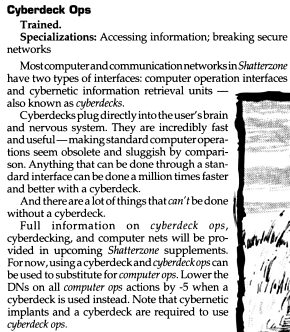
Yeah, you read that right. "We'll wank later. Right now, just treat it as a much better computer."
Demolitions(T) is two wonderfully handy skills in one. It lets you figure out how much boom you need, and makes the boom of your Demobricks bigger. For the first bit, you just tell the GM what you want to destroy, and what other effects you want. Then you roll. For the second, you have to make a roll vs half of the damage value of the explosives and if you make it, check the result on the General Push Results Table. Which is something we'll be hearing from a lot. Technically, I should have mentioned it back at lifting. But hey. Anyway, the difficulty for figuring out how much explosives you need has it's own chart, that splits things up by familiarity. Specializations: Bridges; buildings; armor.
Forgery(U) also has it's own chart. It's just for Licenses and Receipts and other text documents, though. If you want to be an art forget, you have to use the artist skill. You'll also have to use other skills for things like DNA-samples and holographs and security strips. Specializations: Licenses; receipts.
I'm halfway though this infernal section. I've been typing for what feels like days. This is all you guys get today. I'll try to have another one up Sunday.
Simple Concepts
Original SA post
Okay, I think I've finally got into the swing of things here...

It's 1993, do you know where you hilariously exhaustive(and exhausting) skill list is?
Time to move on to Language(T). It's a Macro skill, so you have to choose what language you're actually learning. That's right, you need to spend points in every language you can speak, but don't worry, you get the first one free. Generally, you want "Terran", which doubles as Galactic Common. Because this chart is actually amusing, you get to see it for once.
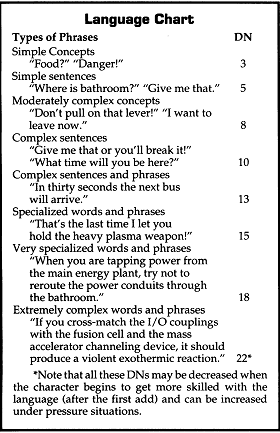
Joe Generico, with a straight Eight in everything, needs Two adds in Language(German) to have a fifty fifty chance of asking the bus driver for the bus schedule or regretfully informing him that he must sing. He needs two adds to have a fifty fifty chance of (This is a Finnish example) informing someone there's a King Cobra about, not just a Married Snake. How hilariously realistic. Part of me always wanted to hold whatever players I might get to this so I could have everyone talking like the cast of Buffy. "Dammit Fortunato you're never getting the... uh.. Big shooty burny thing again! Crap, how come that's a DN 15?"
Linguistics(U) is it's own skill. Of course it is. It's specializations are whatever languages you choose. Mostly, it's for understanding whatever languages you don't speak, but it doesn't actually allow you to be remotely fluent. It's a DN 3 for an American to understand a Canadian. Actually, I'm generalizing a bit, it's also a DN 3 for a New Yorker to understand a Californian. It's a DN 10 for a Frenchman to understand a Spaniard, and a DN 15 to understand Chinese. A completely alien language is a DN 25. But don't worry, if they're asking something simple the difficulty drops by three. That's right, Bathrooms, the universal language. "Scuse me guv, I need to spend a penny." "Ah. The outhouse is over there, pardner." "Thank you." Automatic.
An Ancient Roman shows up and asks for lunch? DN 7(After all, English is related to damn near everything, and Romance Languages are common). "Who was that?" "Marcus Agustus, I think. Wanted to know where the food court was."
Perception(U) is this game's spot. Except it covers damn near everything. It's specializations are as follows: Find, evidence analysis, smell, see, taste, resist surprise. Did you know that it's impossible to startle a CSI? I didn't. Granted, not being surprised is it's own specialization but geeze. No getting the drop on Sherlock.
Psionic Manipulation(T) Very important for the Psi Rat. Now, you have to have the Alien background advantage "Psionic Abilities" to even get it, but that's next chapter. You can only get it after character generation if the GM decides your character has the Psionic Potential. It's got it's own chapter later but what you need to now that it's(rather appropriately) a bit of a book keeping headache. Each power has it's own
Base Difficulty Number
. That's right, you have to roll to see if you can even summon up the willpower to use the power this round. But that's not all! Each power has it's own requirements of how high the Psionic manipulation skill has to be to even be able to use it. But at least to can specialize in particular powers.
To sum up, each psionic power has three hurdles. First, you have to have spent some of your background on being psionic. Secondly, you have to have spent enough of your skill points on Psionic Manipulation to be able to even know a particular power exists. Thirdly, you have to roll well enough/have a high enough skill and attribute combination to do it. Aren't you excited to have requested a Psionicist, Accidental Hipster? Because they're sure happy to have you./scarcasm
Scholar(U) is a Macro skill that basically takes the place of Knowledge for all of you familiar with D20. The Focuses given in the book are Chemistry, Criminal, Physics, System, and Teaching. only two of these really need explanation. System is about one particular solar system, not about computers. It pretty much lets you bullshit asteroid feilds and other minor features into existence. Teaching is important... It lets you teach other skills so that other people can learn them at half the cost.
That's it.
Yep. You can only teach as many Skill Adds as you have in Teaching. But it can be anything you already know yourself. I'd call it a point sink, bu in a way that's actually a really nice party member to have around. Instead of the deticated Heal Bot you have the Teach Bot.
Sensors(T or U) lets you use sensors. Ships Sensors is a trained skill, and it lets you use the ships sensors. If you don't have the skill, you have to get the ships computer to do it. Personal Sensors is Untrained, and lets you use metal detectors, geiger counters, motion sensors, electronic noses, whatever. Good for defeating stealth. Okay as prospecting.
Tracking(U) lets you track things. The base difficulty for tracking is 8, no matter what you're following. Then you look at the table to find the difficulty. If it's been a day the difficulty is +2, +5 if it's been a few, +8 if it's been a week. +5 for tracking in a snow storm, +10 for hard surfaces. -5 if it's a car, -5 if you're tracking something in mud or snow. Simple enough. You can specialize in certain types of terrain.
Trick(U) is practically Young Josephs signature skill. It's for brief deception and confusion. You want something longer lasting, go for Con. It's main purpose is for putting people off guard so you can really lay into them. It can also be used for tricking guards to let you in and losing tails. THe specializations avaliable are Misdirection, Deception... whatever other type of trick you can think of. If you want more information you'll have to pry The Rule Book out of the GM's hands.
And that brings us to
Mind
skills.
Artist is a trained or Untrained Macro skill, meaning that you can't just write down Artist and be done with it. You have to decide if you're a painter, a singer, or whatever. And as it's based on the same stat as Computer Tech and Cyber tech(well get to them), pasty research scientists with no life are better at singing than pop stars... so you too can be The Very Model of a Scientist Solarian.
My wonderful SO is shooting me dirty glares and stating that most painters are probably better singers than most pop singers, too. Moving on...
Business(U) is not for running a business. That's Scholar: Business. No. Business is for sizing up other companies, finding their strengths and weaknesses, and even putting a price on them. It's also for playing the Stock Market. Guessing the value of a stock or business starts at DN 10 and the difficulty goes up based on how complicated the situation really is. Just looking at the stock market and picking a winner at random is a DN 14. Luckily, you can specialize in either guessing the value of things or Stock Speculation.
Computertech(T) lets you repair, assemble, and modify personal and ship computers. The difficulty of or enhancing a computer is the current value of the computer, which is absolutely meaningless to you as it's not in this book. It takes time and money to make a computer better, but most computers are as good as they can get without totally rebuilding them, so stuff that in your pipe and smoke it. Repairing is based on the damage, but most minor damage is DN 8, with major damage being DN 14. Specializations are specific brands of computers and types of operations. So even in the Generic Space future where everyone is running from some threat at the center of the galaxy, you can still say "Sorry, I don't know how to repair an Apple."
Cybertech(T) is... oh god dammit. Cybertech is pretty much a craft skill, except for the fact that anything you build will never quite as good as what you buy unless you put an insane number of points in this. It's for building, repair, and modifying Cyberdecks and cyberware. Every bit of cyber equipment has a Cyber Rating, from one to six. You have to beat a difficulty number of related to the rating to even assemble the damn thing, much less repair of improve it. The Difficulty starts at ten for a Cyber Rating of 1 and hits 22 for a Cyber Rating of 6.
But wait there's more! Building things isn't a simple Pass/Fail experience here. Oh no. How well you succeeded changes things a lot. If you only get a Minimal Success, it'll malfunction any time you suffer a setback while using it. Depending on how you read that, it can be Anytime you get a Stymied or Setback result(Two more terms that mean nothing yet because we haven't gotten to the Basic Rules chapter). On an Average success it only malfunctions on a Setback. With a Good one, it doesn't malfunction at all. With a superior success, not only does it cease to malfunction, but it counts as one cyber rating smaller. So if it was CR 4, it's now CR3.
Improving things works the same way, except with Fewer downsides. A Minimal success gives you a +1, and a Superior gives you a +4, on top of the reduced Cyber Rating thing.
SO what does this actually mean? Let's assume Joe Genero went into Cybertech school. Wit his Eight mind, he needs are least 2 Cybertech Adds to even be able to hit DN 10 half the time. So, half the time, our generic average person would only be able to produce basic products that explode when their owner is stymied. I had to pull out the Rule Book here to figure out exactly what the probabilities were, but.... Here we go. If hit the Difficulty Number on the nose, that's a minimal success. 1-4 over the Difficulty number is average, 5-9 is good, and 10 and over is Superior. The dice will subtract half the time, so again, for a fifty fifty chance, you gotta be right on.
Joe Genero needs 4 adds to be able to not totally fluff up a Cyber Rating two device. Good to know.
Okay, so onto repairing stuff, that's bound to be easier right? Well, sorta. You use the same chart as before, replacing the Cyber Rating with how many wounds the device has taken. So once again, he needs four adds, for a total of 12(Attribute + Skill Adds), to not make a hash of the device. Well Joe, looks like your career as a Cybertechnician is a short one.
I just gotta take a break here to say: I hate shitty craft skills and systems. I've bought entire books just to have better Craft Systems(Those books being [ur/=http://rpg.drivethrustuff.com/product/1107/Guns!-Guns!-Guns!-v1.1?it=1&filters=0_10134_0_0_40030]Guns! Guns! Guns![/url] and the
Atomik
series, both of which I recommend. Atomik cyberware really livened up my Shadowrun games because it resulted in a character having a complete set of cooking implements in his right hand....) Yes, there's a reason I'm not allowed to play a crafter in Dungeons and Dragons or an Alchemist in Pathfinder. But back to Shatterzone.
Hypnotism(T) is a mass of words. Basically, if it's a willing subject, it's really easy because the difficulty number is 18 minus their Mind. Which means that The Nanny, with her Mind of 12, is surprisingly easy to hypnotize. If she's willing. If she's unwilling, it's either her Mind score or her adds in the Willpower skill+8, whichever is higher.
Once you have someone hypnotized, you can either interrogate them, in which case you add your result points(however much you exceeded the target number by) to your Interrogation attempt when you roll. The hypnotized interogatee can still resist, but can't reroll tens or spend life points. So yes, as it stands now, Marry Poppins is better at reading your mind than Joseph Joestar.
Planting a suggestion is more difficult. The difficulty of planting it is based on how friendly the character is to suggestion. So it's easier to get someone to cluck like a chicken than it is to flip out and kill their boss when they next hear "Blue berry pie". The better the success, the longer the suggestion stays in their mind. The duration is determined by the skill roll, not by result points. Which means at at a 15, all of The Nanny's post hypnotic suggestions stay in your mind for sixteen and a half hours unless she rolls really poorly, or rolls well. So Mary Poppins is better at Mind Control too.
Medicine(T) does whatever medicine does. The specializations are Battlefield Medcine, Cybernetic surgery, surgery, and Alien Species. It can be used instead of First aid, but also lets characters who are Healing heal faster, with the aid of the doctor. Naturally, the more serious the wound the higher the difficulty number. Light wounds are DN 10, Wounded is 12, Heavily Wounded is 13, Incapacitated 15, and Mortally wounded 17... And if you're mortally wounded, you have to roll every round until they're stabilized. Luckily, first aid packs have an effective skill of 18, and will make that roll every round until you're either put in a Cold Sleep module or in the hospital.
If you're using it instead of First Aid, use the First Aid chart. It's also used for surgery. That uses the above chart, and something in the equipment section in the Universe guide to determine how much damage you take for getting the cyberware put in or removed.
Navigation is for... Navigation in star ships. You have to roll an 8 to find out information about the star system you're in, then you roll again to find Q-Point, safe places for your ship to jump into. Normally, it takes Ten minutes to find a safe jump point. If you want to find one faster, you have to make a roll against DN 14, and then consult both the general push chart and the Value chart to see how much time you shaved off. If you just wait the ten minutes, it happens automatically.
Psionic Resistance(T) is the Psi Rat's big skill and a big boon for anyone doing Psionics. Hell, who am I kidding, you have to have it. See, when you use an ability, there's a chance of Backlash. This skill lets you not kill yourself whenever you punch someone with your mind, or make them crave coffee. It's also used to resist psionic skills. If you don't have it(and thus aren't psionic) you use Willpower instead.
Psychology(U) is basically medicine for the mind. That's pretty much the whole use of it, rules as written. If you want to actually use it for anything else you'll need Hypnosis and Scholar: Psychology, I guess.
Science
 (T) is a macro skill with such diverse and fun things as Electronics, Mechanical, Spaceship engineering, Space Weapons, Weapon-smithing(Energy), and Weapon-smithing(fire). And yes, you need Energy Weapon-smithing to make a flame thrower. I guess you'd also need Science: Chemistry to make chemical weapons and the like, as it out right says that Scholar is theoretical knowledge and Science if for practical knowledge involving construction and building of things.
(T) is a macro skill with such diverse and fun things as Electronics, Mechanical, Spaceship engineering, Space Weapons, Weapon-smithing(Energy), and Weapon-smithing(fire). And yes, you need Energy Weapon-smithing to make a flame thrower. I guess you'd also need Science: Chemistry to make chemical weapons and the like, as it out right says that Scholar is theoretical knowledge and Science if for practical knowledge involving construction and building of things.
And hey, we're onto
Confidence
. I said nothing about the other stats because it didn't seem like I needed to. But this one is different. Confidence is your self-image and belief. You can browbeat people, and resist based on it. Keep this in mind as I go through the skills.
Con(U) is Con man stuff. If you want to be Nathan Ford, this is what you need. It works like Persuasion/Charm. but it involves being a treacherous cockbite. The difficult is based on the plan, so the more elaborate(IE: Other skill checks you have to make) the easier it is to pull off. The more hasty, the harder. You can specialize in certain types of con. So, as GM, I'd recommend the specializations Hacker, Hitter, Grifter, and Thief.
Faith(U) has you spending skill points to believe in god. Any god. Or your own divinity. Or be a patriot. Or really like the XBoX360. Faith is sort of a combination of Willpower(we're getting there), and Scholar:Whatever you have Faith in. You're only supposed to take adds in it if you believe in something big, but... it can be anything bigger than yourself. Even your own ego. As willpower is used to resist interrogation, you can indeed use your Faith(Toyota) to resist torture. "The Toyota Tacoma wouldn't break down if you demolished a building under it! I'm not going to break from a couple battery cables!"
Interrogation(U) lets you interrogate people. It has it's own section on the interaction chart. The specializations are types of people you like to torture, and ways you like to torture them. Moving on.
Intimidation(U) is what it says on the tin, and has it's own section on the Interaction chart. It's specializations are types of people you like to scare the crap out of, and the ways you like to paint their trousers brown.
Moving on... You get another chart!
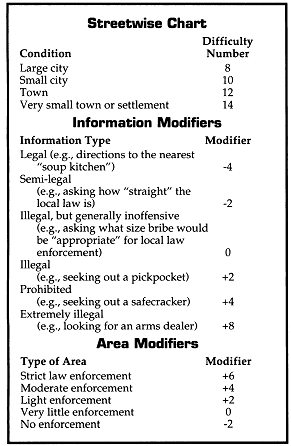
Streetwise(U) is exactly what everyone expects it to be. It's being able to survive in a slightly lawless urban environment. I love, however, that in, say New York City you only need an eight to ask a police officer "How much do I need to pay you for you not to take me to jail right now?" Naturally, it's the 90's, there's more to it than that, it's just not written down on that chart. First you generate the skill total, and then you take into account other things like how much money the person is spending trying to find out, how specific they are, how well known, and a bunch of other stuff that you, the GM, will have to deal with. Specializations: Certain Cities, Criminal Organizations, Certain types of people.
Survival(U) is a macro skill, so you have to chose what type of place you're good with. Jungle survival, Desert Survival, Forest Survival, even Urban Survival. And then there's specializations within the focus, like if you're good at finding food, shelter, places to crap, whatever. The chart is pretty much exactly what you'd expect, and there's a note stating that it's humanocentric, if your character is from a desert world, that'd be Easy instead of grasslands and woods. The part where it gets all 90's is that you have to figure out how close the environment they happen to be in is to whatever their focus is, and subtract Adds for every step away. A guy with forest would only be a slight disadvantage in the jungle or grasslands, but totally lost in the city.
Willpower(U) is your catch all defensive skill for interaction abilities and mental attacks. It's good against Intimidation, interrogation, torture, and Psionic Attack. You can specialize in any of them, but if you have Psi resistance, you can't use Willpower to resist psionic attacks.
Charisma
Charm(U) is used to make friends and influence people. It's a long process and it's "involves serious roleplaying --- not just rolling the dice". Complete rules are found in the rule book. You can specialize in Seduction or Friendliness. Meaning you too can be a pick-up artist, so long as you don't mind creeping on your GM.
Disguise(U) alters your features. Base difficulty is eight, and it's got a chart. Long story short, though, it's no surprise Joseph failed the trick the Nazis, as he had to get 12 with no ranks in the skill. Your success levels determine how well they hold up. You can specialize in Stage Costuming and Impromptu Disguises.
Persuasion(U) covers bargaining, browbeating, and bribery. It also covers Logic and reason but those don't start with B. Short story is the other guy resists with willpower. Long story is, look at chapter three in the rule book.
Taunt(U) is also explained elsewhere, so they're not going to give you more than "It is used to insult, upset and annoy a target so that he will think less clearly and will not be able to react with good judgment."
So that's attributes and skills done.
Bonus Character Concepts
Reading through this with intent to explain it has resulted in my noticing weird confluences of skills. When I get done with the player book, I'm going to post a PDF of various Wacky, not for serious use characters that have been inspired by both the thread and the rules. So that if you ever have a Shatterzone GM, you can at least drive him half as mad as he'll drive you. They're incomplete for now, and just sketches of the sort of insane shit you... won't actually find in this game.
Detective Tongue
It's strange how few people understand what you understand. The world is a veritable cornucopia of flavors, and they all mean something. From the pain and fear the meat went through as it died, to the type of motor oil used in the car... you know it all. Of course, given that your species communicates through taste and only uses sounds when you cant touch each other, you tend to be looked at funny for licking people's hands and peeing on the carpet. It's not easy being a three foot tall pink lizard.
Quote: "Lick! Licki-tongue."
Mind 13
Perception:5 Taste 6
Background Advantages: Eat Anything(Xeno-Ability 2) Extra Skill Add (Perception) Fame 2(It's that alien detective that licks things!)
Background compensation: Alien Prejudice 3(non-humanoid), Metabolic Difference(Eat all the things!(Xeno-Flaw 1)), Alien Outlook(Xeno Flaw 2), Language 1(Can understand Terran/Standard, can't speak it)
A.P.C.
You're really, really good at moving people. Freakishly good, in fact. Not terribly bright though. That's okay, the little man you wear on your back does the thinking.
Quote: "Push wheel?"
Mechanical Maneuver 3
Running 2 While Encumbered 6
Lifting 1 People 6
Faith: Little man in bag 5
Captian Corp
All these people, they don't understand what you understand. The Company is Mother and Father. The Company takes care of all of us. Especially you. They wouldn't have put so much time and effort into you if that weren't the case. You're their hands on the street and their face on the ceral box... and occasional serial bus.
Quote: "What, you think this A on my head is for Omni Consumer Products?"
Fire Combat 2 Rifles 6
Faith: Megacorp of Choice 5
Charm 2 Friendliness 6
Persuasion 2 Buy My Shit 6
Background Advantage: Cybernetics 3(Top of the line, rare stuff)
Scientist Solarian
Quote: "Do you want me to sing the song? I can sing the song again."
Fire Combat 4
Intellect 13
Scholar: Medicine 5
Mind 14
Artist: Singing 5(Total 19)
Medicine 5
Science
 :Genetic engineering (5)
:Genetic engineering (5)
Background Advantages: Ability Limit Increase: Mind(3 points) Extra Skill Add(Medicine, Artist, Scholar Medicine, Science Genetic Engineering)
Background Compensations: Cold Blooded (Xeno Flaw 2) Metabolic Differences(Xeno Flaw 1)